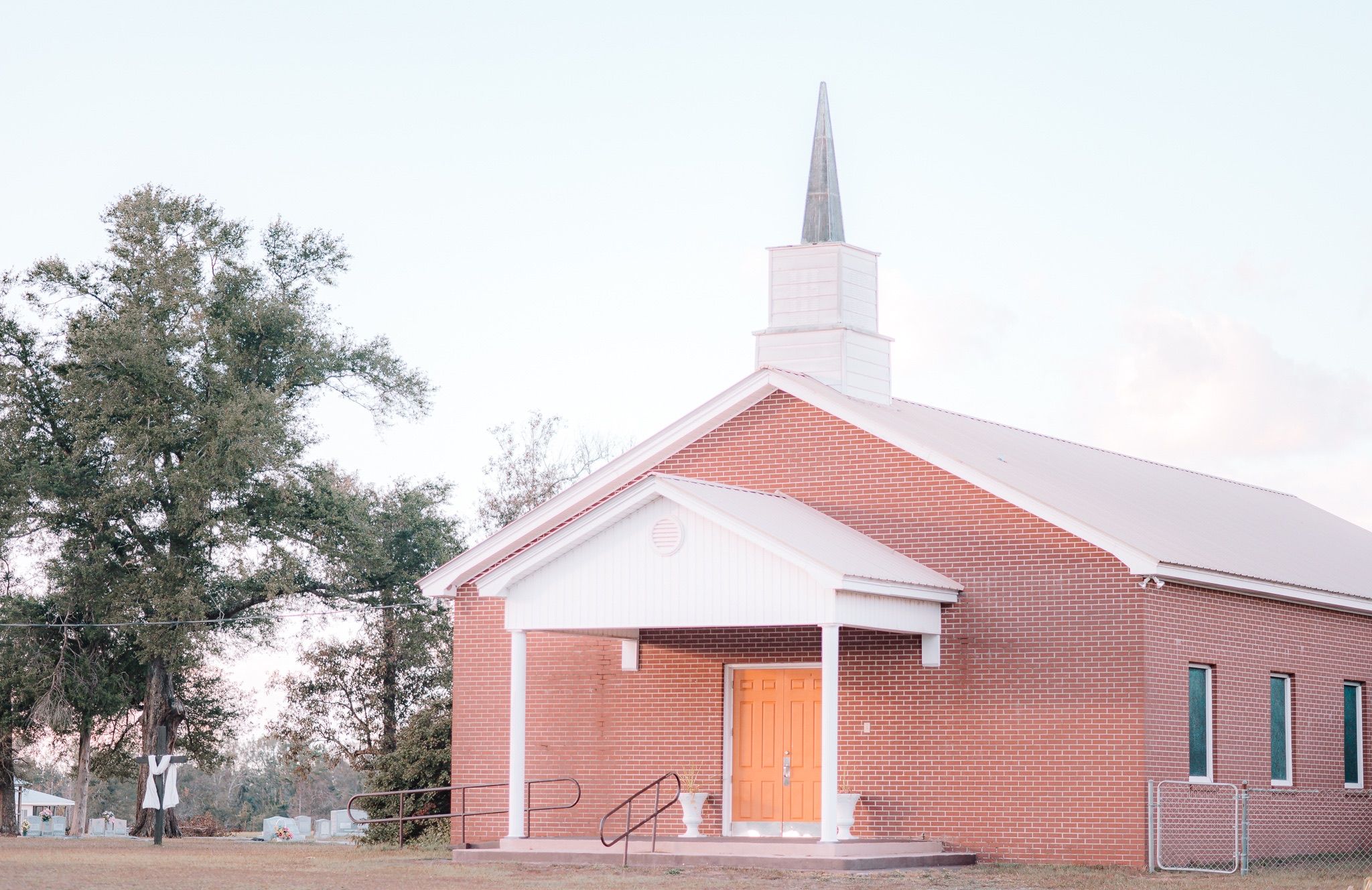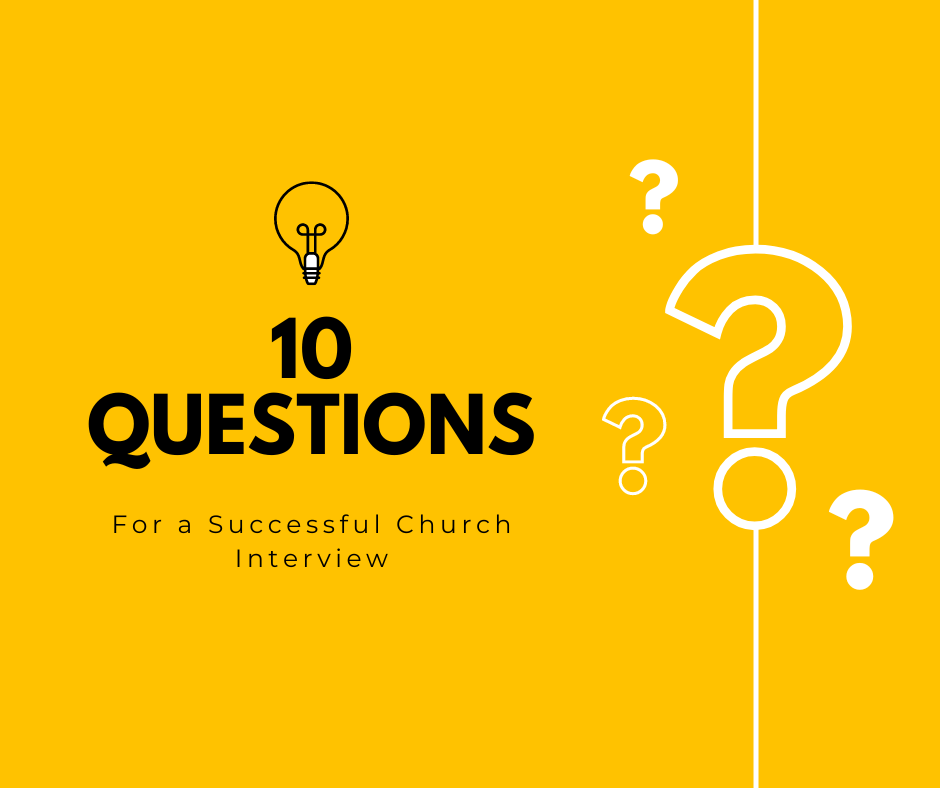10 Questions to Ask in your Church Interview
10 Questions to Ask in your Church Interview
Setting Clear Expectations
If I could pull back the curtain between an associational leader and a pastor, there are many difficult conversations about the hardships of pastoral ministry. Some of you may have had these conversations yourselves. Many issues arise due to a lack of communication, disunity between church members, and others simply because of prideful behavior on all sides. But pastors who are struggling in their churches normally have one thing in common: there were unclear expectations of their ministry when they started. They just didn’t ask enough questions.
A friend of mine went into an interview to be a Worship Pastor at a local church. When he sat down, the search committee asked him some basic questions about his family. Then, one of the men said, “We just have one question for you. Are you a Calvinist?” The young man fumbled his way through a response and told them that his focus was simply engaging the church in worship. They hired him with no other questions. His tenure of ministry was one of tumult – they never told him their expectations, and it caused major issues.
Some search committees need training in asking the right questions. But most interviews conclude with, “Do you have any questions for us?” A mature pastor who is trying to seek out God’s will should definitely have some questions to ask to that search committee.
During the interview process of a church, everything is exciting. The idea of a fresh start and a new opportunity can sometimes cloud our clarity in seeking God’s will. During an interview, things are not always what they seem. As a result, some leaders have a shorter tenure at a church than they originally anticipated.
One of the ways that pastors and leaders can prevent making the wrong decision is by asking the right questions during a church interview. On a recent podcast episode of the Replant Bootcamp, Jimbo and Bob discussed 10 great questions to ask to the search committee. A church does not only need to find out if the pastor is a good fit for their church; a pastor needs to find out if a church is a good fit for their ministry style. These 10 questions will be helpful as you get ready to sit down in an interview with the church leadership.
1.What are your expectations for me and for my family?
 Unexpressed expectations always lead to disappointment and conflict. If you are a few months into the job and are being compared to the former pastor, whether negative or positive, it is unfair to your ministry. Asking this question during the interview process will encourage the search committee to make sure they don’t compare you to a previous leader. You have your own gifts and personality that mesh with ministry. Asking this question can tell you a lot about a church, specifically if they have expectations that go beyond the scope of regular ministry work. Church committees should have a clear job description that goes over the daily expectations of their pastor. Also take time to discuss any “spoken,” but not “written” expectations.
Unexpressed expectations always lead to disappointment and conflict. If you are a few months into the job and are being compared to the former pastor, whether negative or positive, it is unfair to your ministry. Asking this question during the interview process will encourage the search committee to make sure they don’t compare you to a previous leader. You have your own gifts and personality that mesh with ministry. Asking this question can tell you a lot about a church, specifically if they have expectations that go beyond the scope of regular ministry work. Church committees should have a clear job description that goes over the daily expectations of their pastor. Also take time to discuss any “spoken,” but not “written” expectations.
2. What do you think are the marks of a healthy church?
A little bit of self-reflection goes a long way. This question is important to gauge how the church understands itself. It also communicates to the leadership team that you want to discover the positive and negative aspects of their church. While I wouldn’t expect to hear someone go over Mark Dever’s 9 Marks of a Healthy Church, it would still help to hear them explain from their perspective if their church is healthy or not. Some pastors want to focus mainly on helping churches pursue health in the form of revitalization, and if you’re a seasoned pastor who has experience, you will have an idea of where to start with them. A good follow-up to this question is “How does this church measure up to those goals?”
3. Why did the previous pastor leave?
What were the events that led up to your interview? While this may be an uncomfortable question to ask, their answers can tell you a lot about their current situation. Did the previous pastor leave out of a forced termination, or a different ministry opportunity? Did they retire from the ministry?
4. What is the community around the church like?
 Like the church health question, this helps you understand how they see the surrounding community. If the church is totally different from the surrounding community, then there are some additional questions to ask: Is the church actively engaging the community? Have they been disconnected from the community? Do they think loving the community is insignificant? I would also encourage you to go to the Associational leader, or other members in the community and ask them, “What is the reputation of this church in the community?”
Like the church health question, this helps you understand how they see the surrounding community. If the church is totally different from the surrounding community, then there are some additional questions to ask: Is the church actively engaging the community? Have they been disconnected from the community? Do they think loving the community is insignificant? I would also encourage you to go to the Associational leader, or other members in the community and ask them, “What is the reputation of this church in the community?”
5. What are some of the greatest joys or frustrations that this church has gone through?
The history of the church is a significant factor of helping understand a church. Asking this question gives the leadership a chance to be honest with themselves. You need to know what situation you are walking into. Has the church had major splits in their history? Are they currently in turmoil? What joy and celebrations have they seen in the past? This question gives you the chance to begin your ministry by either building off a previous legacy, or changing the tides of the past.
6. How does the congregation view the role of the pastor’s wife?
This question is important to ask because it carries the language of expectation. Some churches have had very active pastor’s wives, who led women’s ministry opportunities or provided childcare every Sunday morning. However, if you have a wife who feels more inclined to serve in a worship ministry or different area, they could be in for a rude awakening when dealing with some church members. Wives of pastors should feel the freedom, as any other church member, to serve in whatever way they are gifted and called. A happy spouse serving freely in a church can make all the difference in the world in your ministry.
7. If I am being successful, what am I doing? How do you view success in your church?
Success, while related to expectations, helps a church think about their goals in a positive light. Every church will want their pastor to thrive and lead their church well, so leadership should be able to provide a good answer to this. What you will find is that in asking this question, they may bring up specific goals that were lacking or excelling in their previous leadership.
8. How much are you going to pay me? If there are going to be increases, how will those be handled?
 While you may be afraid to ask this question, it is important to ask, nonetheless. I’ve heard people say, “If God called me here, I shouldn’t worry about the money.” But if you have a family, medical expenses, bills, vehicle payments, and student loan debt, you should seriously consider this question: would God call you into a situation where you couldn’t provide for your family? In seeking God’s will for your life, it’s important that we factor in our families and our life situation. As a pastor, your first priority is to your family, and then your church.
While you may be afraid to ask this question, it is important to ask, nonetheless. I’ve heard people say, “If God called me here, I shouldn’t worry about the money.” But if you have a family, medical expenses, bills, vehicle payments, and student loan debt, you should seriously consider this question: would God call you into a situation where you couldn’t provide for your family? In seeking God’s will for your life, it’s important that we factor in our families and our life situation. As a pastor, your first priority is to your family, and then your church.
9. If you have concerns with me, how will you let me know?
Last week, the podcast dealt with forced termination. This sometimes takes place in the form of anonymous letters, a late night phone call or visit from church members, or cold-shouldering that keeps you questioning what happened. Asking this question to church leadership helps keep them accountable for how they will handle disagreement or conflict in the church when it comes to your leadership. This should be clearly written in the church’s constitution and by-laws.
10. If you have concerns with me, how will you let me know?
Plan on reaching out to former pastors and interviewing them. Ask them what their experience was like. As you do so, remember that there are two sides to every story, and recognize that not every person placed in a leadership position is the best fit for a local church. This can help with making sure there are no decision-ending topics that come up.
God is sovereign and he is in control of all things. He knew you’d be sitting in that interview chair. Ask the right questions and pray, seeking God’s peace that passes all understanding in your decision. Wait for God’s timing, and don’t rush the process.















